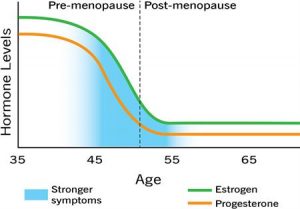Menopause can be a daunting experience that many women are simply not prepared for. Menopause is one of those hormonal events that will impact each women differently but one of the most common frustration is unexpected weight gain symptom.
In recognising menopause may be taking place to your body making informed choices when it comes to nutrition and lifestyle can really help make the transition into menopause more bearable and help to ward off the weight gain issues.
What is menopause?
Menopause refers to a natural process whereby women have their final menstrual period. This occurs when a woman has had no menstrual period, bleeding, spotting or staining for at least 12 months. Women are born with approximately 1 million eggs in each ovary. At puberty, about 300,000 eggs remain and by the menopause, there are no active eggs left in a woman’s ovaries. There is support a GP can offer around the diagnosis of whether you are going through menopause.
When does menopause occur?
Most women reach menopause between 45 and 55 years of age. However, in some cases, menopause can occur prematurely as a result of cancer treatment, surgery or unknown causes. From the age of 35 to 40 years, the number of eggs left in a woman’s ovaries starts to decline more rapidly and ovulation occurs less regularly until the menstrual period stops.
What are the sign sand symptoms of menopause?
- Hot flushes, night sweats or feeling hot
- Mood swings, which may include low mood, anxiety, or irritability
- Body and joint aches and pains
- Sleep disturbance
- Weight gain, especially in the tummy region
- Vaginal changes such as dryness
The stages of menopause
- Perimenopause – the lead up to the menopause (limited number of eggs left in the ovaries)
- Menopause – the final menstrual period (no more active eggs left in the ovaries)
- Post-menopause – the natural absence of menstrual periods for at least a year

The link between hormones and menopause
Hormones are chemicals made in the body, which send out messages through the bloodstream and provide orders to cell and organs. The hormones of relevance at menopause are oestrogen and to a lesser extent, progesterone. The symptoms associated with menopause are initiated by changes in the levels of these hormones, which usually occur over months or years as women approach menopause.
Below is a diagram which highlights the drop in hormones, oestrogen and progesterone as a woman approaches menopause.

Weight gain a common symptom women experience when transitioning towards menopause;
Weight gain accompanied by an increased tendency to carry additional fat stores around the abdomen is common among women during the menopausal transition. These changes are usually due to several factors which may differ from woman to woman, but may include:
- A loss of muscle mass tissue associated with ageing
- A reduction in basal metabolic rate (or the ability to “burn calories” at rest).
- Lifestyle changes such as leaving full time work
- Changes in the types of physical activity (i.e., moving away from higher intensity sports/activities towards more gentle exercise)
- Fat is metabolised differently due to the drop in oestrogen
- Sleep issues interrupt appetite regulation
- Genetics
- Increased insulin resistance
Strategies to assist with weight gain during the menopausal transition
- Improve sleep hygiene
Practice good sleep hygiene by keeping your bedroom at a comfortable temperature, going to bed at the same time every night, switching screens and smartphones off at least an hour or more before bedtime, limiting alcohol intake and avoiding caffeinated beverages past midday and avoid napping in the late afternoon or evening if you can. Making sure you have some down time before bed is also essential. This may include reflecting on your day, meditating, journaling or even chatting with your partner. If you struggle with conditions like reflux/GERD, make sure you eat your last meal no later than 3 hours prior to bedtime.
- Exercise regularly and consistently
Participating in physical activity results in many health benefits for women transitioning through the menopausal phase. Keeping physically active is important for controlling weight, maintaining, or building lean muscle mass, preventing bone loss and assists with mood disturbances. Including a variety of exercises in your is recommended. Cardiovascular(aerobic) exercise, such as brisk walking or running, strengthens the heart and lungs, helps improve the blood sugar and insulin response, while strength and resistance training assists with age-related loss of muscle mass. In addition, exercise is important for the prevention and management of osteoporosis and metabolic disease.
- Eat a healthy, balanced diet
A Low Carbohydrate Healthy Fat (LCHF) diet is an increasingly popular way to assist with weight gain during the menopausal transition. It limits carbohydrates, sugars, and highly refined oils. In doing so, it reduces the bodies need for insulin and improves insulin sensitivity. As a result, this supports weight loss and improves cardiovascular health. Following a low carbohydrate healthy fat diet means that foods like bread, pasta and rice take a back burner, while high quality proteins, greens, omegas and fats become central to your diet. Cutting back on carbs and introducing more healthy fats into your diet is an excellent way to manage the symptoms associated with menopause.

- Drink plenty of water
Hydration is key in improving a whole range of menopausal symptoms. Since oestrogen helps keep us hydrated, the menopause causes our bodies to lose the ability to efficiently retain water. Therefore, drinking a regular, healthy amount of water, ideally 2L each day, will help maintain your skin’s moisture and offset of dryness. In addition, drinking water can help prevent weight gain and aid in weight loss by helping you feel full.
Summary
The physiological changes that take place during the menopausal transition can be daunting, distressing and leave you feeling frustrated and at times upset. The good news is that making healthy lifestyle choices including maintaining a healthy, balanced diet and staying physically active can make the experience and transition through menopause that little bit easier to manage, prevent weight gain and reduce the risk of metabolic disease and other health complications. Should you have any personal concerns or wish to seek help with your lifestyle during this time please feel encouraged to contact our clinic here.
![]()
CLINIC CONTACT DETAILS
Phone: (03) 6301 9096
Fax: (03) 6301 9201
Email: info@
Make an online booking: https://nutritionforlifehealthcare.cliniko.com/bookings
Located: 22 Pine Av, Newstead TAS 7250 (parking via 48 Belhaven Crescent Newstead)



